新人教版八年级英语上册uni知识点总结
新版英语人教版八年级上册重点难点知识点讲解归纳总结
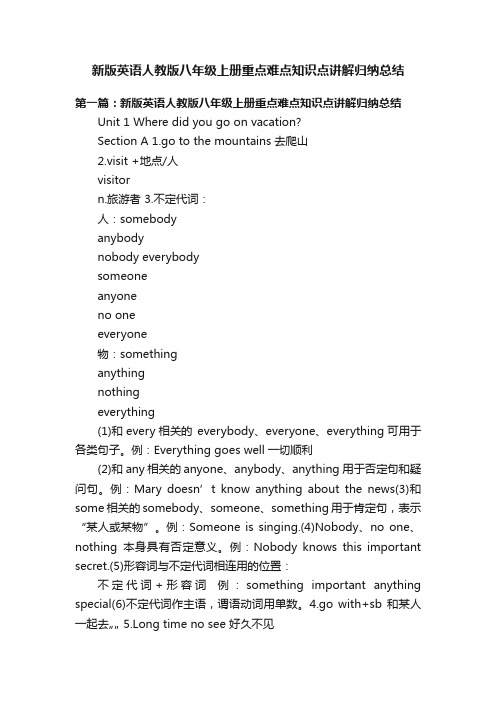
新版英语人教版八年级上册重点难点知识点讲解归纳总结第一篇:新版英语人教版八年级上册重点难点知识点讲解归纳总结Unit 1 Where did you go on vacation?Section A 1.go to the mountains去爬山2.visit +地点/人visitorn.旅游者 3.不定代词:人:somebodyanybodynobody everybodysomeoneanyoneno oneeveryone物:somethinganythingnothingeverything(1)和every相关的everybody、everyone、everything可用于各类句子。
例:Everything goes well一切顺利(2)和any 相关的 anyone、anybody、anything用于否定句和疑问句。
例:Mary doesn’t know anything about the news(3)和some相关的somebody、someone、something用于肯定句,表示“某人或某物”。
例:Someone is singing.(4)Nobody、no one、nothing本身具有否定意义。
例:Nobody knows this important secret.(5)形容词与不定代词相连用的位置:不定代词+形容词例:something important anything special(6)不定代词作主语,谓语动词用单数。
4.go with+sb 和某人一起去…… 5.Long t ime no see 好久不见6.quite a few相当多=lots of=a lot of=plenty of 接可数名词a few有一些、few很少(几乎没有、否定概念)接不可数名词a little有一些、little很少(几乎没有、否定概念)7.take photos拍照take photos with 和……合影take photos of 给……拍照8.what about+名词/代词/动名词9.Most of the time大多数时间谓语动词的单复数取决于Most of 后面所修饰的名词例:Most of the students go to the beach.例:Most of the water turns green.10.taste/look/feel/sound/smell+形容词11.一切顺利:Everything was excellent./ Everything goes well12.你认为……怎么样?How do you like…?=what do you think of …?= how do you feel about…? 13.buy sb sth=buy sth for sb 14.Seem 看起来……(1)seem+形容词例:Tom seems tired.(2)Seem like “好像” 例:It seems like a good idea.(3)Seem to do“似乎” 例:I seem to have a cold.(4)It seems/seemed +从句“似乎” 例:It seems that I can pass the exam.15.nothing much to do没什么事可做nothing…b ut出了……之外,什么也没有16.Bye for now 到这该说再见了17.feed----fed 喂养 18.Keep a diary 记日记Section B 1.到达(1)arrive in+大地点arrive at+小地点(2)get to +地点(3)reach+地点 2.decide to do 决定做……3.try doing sth 动作已发生,不一定付出太多努力try to do sth动作未发生,付出努力 4.(1)feel like+从句“感受到……”例:He feels like he is swimming.(2)feel like “想要……”+名词/代词/动名词例:Do you feel like taking a walk with me?5.wonder “想知道,琢磨”后接who,what,why等疑问词引导的宾语从句。
新人教版英语八年级上册各单元知识点总结归纳

八年级上册英语各单元知识点大归纳Unit 1 Where did you go on vacation?【语法解析】不定代词:不指名代替任何特定名词或形容词的代词叫做不定代词。
用法注意:1. some 和any +可数名/不可数名。
some 多用于肯定句,any多用于否定句、疑问句和条件从句。
有些问句中用some,不用any, 问话者希望得到对方肯定回答。
2. 由some, any, no, every 构成的复合不定代词作主语时,其谓语动词用第三单3. 不定代词若有定语修饰,该定语要置于其后:如:something interesting二、知识点:1. buy sth for ab./ buy sb. sth 为某人买某物2. taste + adj. 尝起来……3. nothing ….but + V.(原形) 除了……之外什么都没有4. seem + (to be) + adj 看起来5. arrive in + 大地方 / arrive at + 小地方到达某地6. decide to do sth. 决定做某事7. try doing sth. 尝试做某事 / try to do sth. 尽力做某事8. enjoy doing sth. 喜欢做某事 9. want to do sth. 想去做某事10. start doing sth. 开始做某事=begin doing sth.11. stop doing sth. 停止做某事区分: stop to do sth. 停下来去做某事12. dislike doing sth. 不喜欢做某事14. so + adj + that + 从句如此……以至于……16. tell sb. (not) to do sth. 告诉某人(不要)做某事17. keep doing sth. 继续做某事18. forget to do sth. 忘记去做某事 / forget doing sth 忘记做过某事词语辨析:1. take a photo/ take photos 拍照quite a few+名词复数“许多…”2. seem 形容词看起来….. You seem happy today.to do sth. 似乎、好像做某事 I seem to have a coldIt seems + 从句似乎…. It seems that no one believe you.seem like ….好像,似乎….. It seems like a good idea.3. arrive in +大地点,= get to= reach+地点名“到达...”arrive at +小地点(注:若后跟地点副词here/there/home, 介词需省略,如:arrive here; get home)4. feel like sth/ doing sth. 感觉像是…5. wonder “想知道”,+疑问词(who, what, why)引导的从句。
新人教版八年级上册英语知识点总结大全
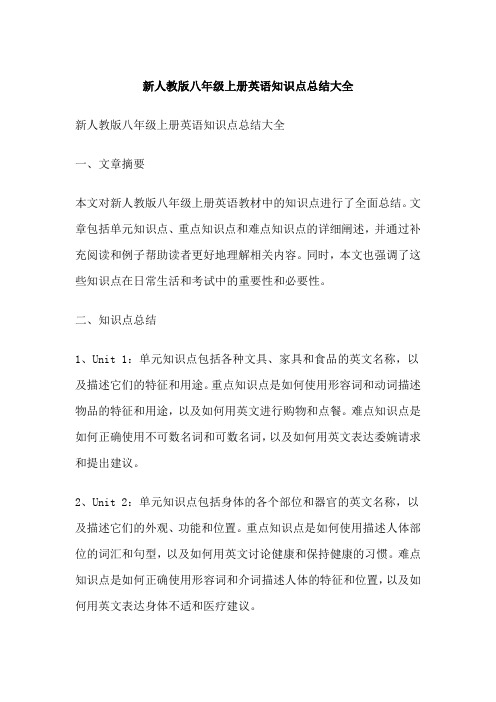
新人教版八年级上册英语知识点总结大全新人教版八年级上册英语知识点总结大全一、文章摘要本文对新人教版八年级上册英语教材中的知识点进行了全面总结。
文章包括单元知识点、重点知识点和难点知识点的详细阐述,并通过补充阅读和例子帮助读者更好地理解相关内容。
同时,本文也强调了这些知识点在日常生活和考试中的重要性和必要性。
二、知识点总结1、Unit 1:单元知识点包括各种文具、家具和食品的英文名称,以及描述它们的特征和用途。
重点知识点是如何使用形容词和动词描述物品的特征和用途,以及如何用英文进行购物和点餐。
难点知识点是如何正确使用不可数名词和可数名词,以及如何用英文表达委婉请求和提出建议。
2、Unit 2:单元知识点包括身体的各个部位和器官的英文名称,以及描述它们的外观、功能和位置。
重点知识点是如何使用描述人体部位的词汇和句型,以及如何用英文讨论健康和保持健康的习惯。
难点知识点是如何正确使用形容词和介词描述人体的特征和位置,以及如何用英文表达身体不适和医疗建议。
3、Unit 3:单元知识点包括时间和日期的英文表达方式,以及描述日常活动和计划的句型和词汇。
重点知识点是如何用英文表达时间和日期,以及如何用情态动词和动词短语表达日常活动和计划。
难点知识点是如何正确使用序数词和基数词表达日期,以及如何用英文表达将来的时间和计划。
4、Unit 4:单元知识点包括家庭成员、职业和地点的英文名称,以及描述它们的特征和功能。
重点知识点是如何使用描述人物和地点的词汇和句型,以及如何用英文讨论家庭、职业和地点。
难点知识点是如何正确使用名词和代词描述人物和地点,以及如何用英文表达个人喜好和观点。
5、Unit 5:单元知识点包括天气、服装和季节的英文表达方式,以及描述人们的活动和喜好。
重点知识点是如何用英文表达天气、服装和季节,以及如何用动词短语和从句描述人们的活动和喜好。
难点知识点是如何正确使用名词和形容词描述天气、服装和季节,以及如何用英文表达个人喜好和偏好的原因。
新人教版八年级上册英语单元语法及知识点整理

新人教版八年级上册英语单元语法及知识点整理Unit 1 - How do you study for a test?Grammar- Present Simple Tense Present Simple Tense- Used to express habits or routines- Example: I usually study for tests by making flashcards.- Present Continuous Tense Present Continuous Tense- Used to express actions happening at the moment of speaking- Example: I am studying for my English test right now. Knowledge Points- Adverbs of Frequency Adverbs of Frequency- Used to talk about how often something happens- Example: I always review my notes before a test.Unit 2 - What's the matter?Grammar- Subject-Verb Agreement Subject-Verb Agreement- Singular subjects require singular verbs and plural subjects require plural verbs- Example: He has a headache. They have headaches.Knowledge Points- Health Problems and Symptoms Vocabulary Health Problems and Symptoms Vocabulary- Example: headache, fever, sore throat, etc.Unit 3 - Where did you go?Grammar- Past Simple Tense Past Simple Tense- Example: I visited my grandparents last weekend.Knowledge Points- Vocabulary for Places Vocabulary for Places- Words and phrases related to different locations- Example: museum, park, restaurant, etc.Unit 4 - Don't eat in class.Grammar- Imperative Sentences Imperative Sentences- Example: Don't talk during the exam.Knowledge Points- Classroom Rules and Guidelines Classroom Rules and Guidelines- Vocabulary and phrases related to behavior in the classroom - Example: raise your hand, be quiet, pay attention, etc.Unit 5 - Why do you like pandas?Grammar- Questions with "Why"Questions with "Why"- Used to ask for reasons or explanations- Example: Why do you like playing basketball? Knowledge Points- Animal Vocabulary Animal Vocabulary- Words and phrases related to different types of animals- Example: lion, tiger, panda, etc.。
(完整版)最新人教版八年级英语上册知识点总结(全)
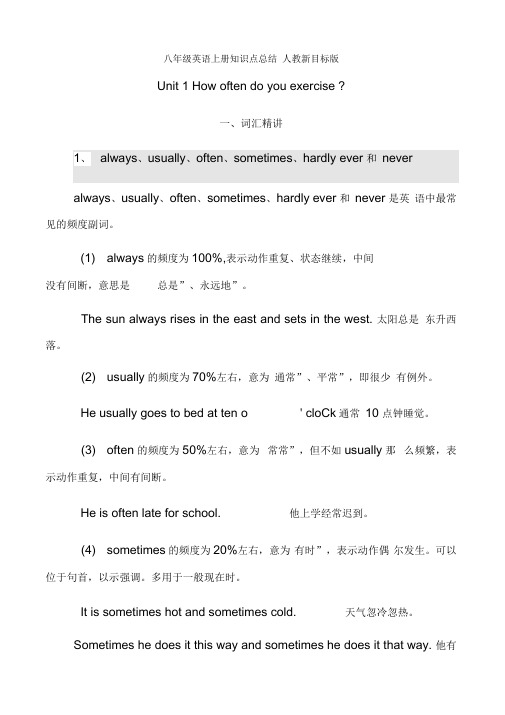
八年级英语上册知识点总结人教新目标版Unit 1 How often do you exercise ?一、词汇精讲always、usually、often、sometimes、hardly ever 和never 是英语中最常见的频度副词。
(1) always的频度为100%,表示动作重复、状态继续,中间没有间断,意思是总是”、永远地”。
The sun always rises in the east and sets in the west. 太阳总是东升西落。
(2) usually的频度为70%左右,意为通常”、平常”,即很少有例外。
He usually goes to bed at ten o ' cloCk通常10 点钟睡觉。
(3) often的频度为50%左右,意为常常”,但不如usually那么频繁,表示动作重复,中间有间断。
He is often late for school. 他上学经常迟到。
(4) sometimes的频度为20%左右,意为有时”,表示动作偶尔发生。
可以位于句首,以示强调。
多用于一般现在时。
It is sometimes hot and sometimes cold. 天气忽冷忽热。
Sometimes he does it this way and sometimes he does it that way. 他有时这样做,有时那样做。
(5) hardly ever的频度为5%左右,意为几乎不”、偶尔”,表频率,位置是行前be后”。
I hardly ever go out these days. 这些天我几乎不出门。
(6) never的频度为0,意为从来不”、泳不”。
My parents are never late for work. 我父母上班从来不迟到。
【拓展】(1) 这些副词在句子中的位置基本相同,一般放在助动词、be 动词或情态动词之后,行为动词之前。
新人教版初中英语八年级上册知识总结(最全)
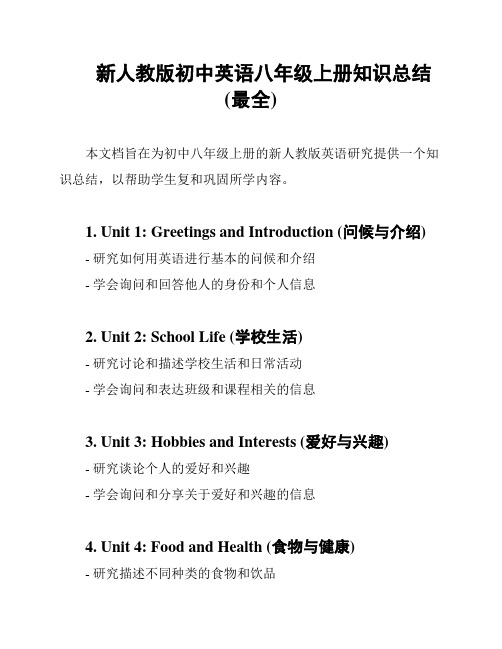
新人教版初中英语八年级上册知识总结(最全)本文档旨在为初中八年级上册的新人教版英语研究提供一个知识总结,以帮助学生复和巩固所学内容。
1. Unit 1: Greetings and Introduction (问候与介绍)- 研究如何用英语进行基本的问候和介绍- 学会询问和回答他人的身份和个人信息2. Unit 2: School Life (学校生活)- 研究讨论和描述学校生活和日常活动- 学会询问和表达班级和课程相关的信息3. Unit 3: Hobbies and Interests (爱好与兴趣)- 研究谈论个人的爱好和兴趣- 学会询问和分享关于爱好和兴趣的信息4. Unit 4: Food and Health (食物与健康)- 研究描述不同种类的食物和饮品- 学会提醒他人注意饮食健康和生活惯5. Unit 5: Festivals and Celebrations (节日与庆祝) - 研究讨论和描述各种节日和庆祝活动- 学会询问和分享关于节日和庆祝的信息6. Unit 6: Travel and Transportation (旅行与交通) - 研究谈论旅行和交通方式- 学会询问和表达关于旅行和交通的信息7. Unit 7: Daily Routines (日常作息)- 研究讨论和描述日常作息和活动安排- 学会询问和分享关于日常作息的信息8. Unit 8: Environmental Protection (环境保护)- 研究讨论和描述环境保护的重要性和方法- 学会提醒他人关于环境保护的意识和行动本文档总结了新人教版初中英语八年级上册所有单元的核心内容。
希望这个总结能帮助同学们回顾和巩固所学的知识,以便更好地应对考试和实际应用。
人教版英语八年级上册 知识点笔记

人教版英语八年级上册知识点笔记
本文档是人教版英语八年级上册的知识点笔记,内容包括但不
限于以下几个部分:
Unit 1 重点知识
1. 表示时间的几种表达方法:on+具体日期、at+具体时间点、
in+时间段、every+时间段、once a week/month/year等。
2. 祈使句的用法及其五种基本句型:肯定祈使句、否定祈使句、let's句型、why not句型、would you mind句型。
3. 陈述句、疑问句、祈使句、感叹句四种句型的用法及转换。
Unit 2 重点知识
1. 过去完成时的构成及用法,表示过去已经完成的动作或状态。
2. 直接引语和间接引语的转换方法及其注意事项。
3. 一些常见的连词及其用法:although、as、because、since、when、while等。
Unit 3 重点知识
1. 现在完成时的构成及用法,表示过去发生的动作对现在造成的影响或结果。
2. 一些常见的副词及其用法:already、yet、just、never、ever 等。
3. 形容词的比较级和最高级的构成及其用法。
......
本文档只是对知识点进行简单概括,更详细的内容需要在课本和相关资料中学习和掌握。
同时,建议同学们进行课后练习和自我检测,加深对知识点的理解和记忆。
最全面人教版八年级上册英语第一单元知识点归纳总结
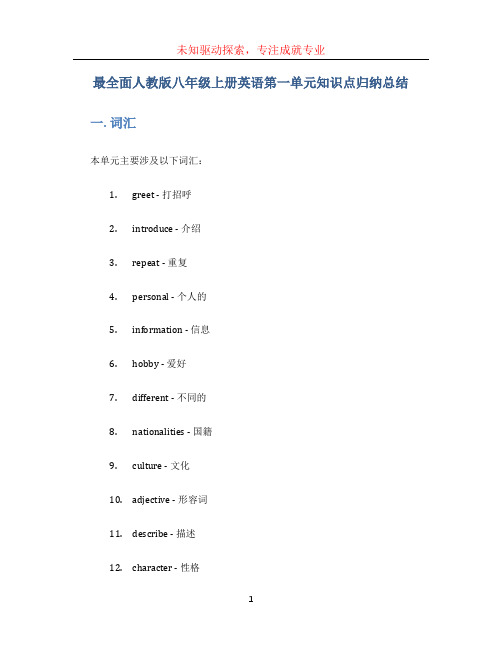
最全面人教版八年级上册英语第一单元知识点归纳总结一. 词汇本单元主要涉及以下词汇:1.greet - 打招呼2.introduce - 介绍3.repeat - 重复4.personal - 个人的rmation - 信息6.hobby - 爱好7.different - 不同的8.nationalities - 国籍9.culture - 文化10.adjective - 形容词11.describe - 描述12.character - 性格二. 语法本单元的语法重点包括:1.be动词(am, is, are)–表示个人特征和国籍,e.g. I am from China.–表示人称和单复数,e.g. We are students.2.人称代词–主格:I, you, he, she, it, we, they–宾格:me, you, him, her, it, us, them3.物主代词–形容词性:my, your, his, her, its, our, their–名词性:mine, yours, his, hers, its, ours, theirs4.形容词的比较级和最高级–比较级:形容词+er,e.g. happier–最高级:the+形容词+est,e.g. the happiest5.数词的基数词和序数词–基数词:one, two, three…–序数词:first, second, third…三. 句型本单元的常用句型有:1.问候语–How do you do?–Nice to meet you.–Good morning/afternoon/evening.2.自我介绍–My name is [name]. I am [age] years old. I am from [country].3.描述个人特征–I am [adjective].–He/She is [adjective].–They are [adjective].4.提问对方的个人信息–What’s your name?–How old are you?–Where are you from?四. 对话本单元的对话主要涉及以下场景:1.两人相互介绍个人信息2.询问对方的国籍和爱好3.描述自己和他人的外貌和性格特征4.向他人提问个人信息并进行回答五. 拓展练习为了加深对本单元知识点的理解和应用,推荐进行以下练习:1.编写自我介绍,包括姓名、年龄、国籍、爱好等。
人教版八年级上册英语知识点归纳

人教版八年级上册英语知识点归纳Unit 1:1. A person who is creative is able to use original and unusual ideas.2. Justin decided to start his own company instead of working for others.3. It is the first time for him to travel to another country.4. With the help of new technology, we will be able to control the weather better.5. The world is changing quickly, and we need to keep up with it.Unit 2:1. My brother is crazy about computer games, so he spendsa lot of time on them.2. You’d better not talk about your plan, or otherpeople may steal your idea.3. I spent most of my time on my homework during thewinter vacation.4. It is a waste of time to play computer games every day.5. She was so tired that she fell asleep quicklyUnit 3:1. Do you have any ideas about how to solve the problem?2. Rather than go to the supermarket, I would like toorder food online.3. The old man lived alone, and nobody cared about him.4. She didn’t understand the passage and asked theteacher for help.5. The little girl didn’t want to leave her mother and cried bitterly.。
人教版英语八级上册九单元Uni词组句型作文知识点整理精品PPT课件
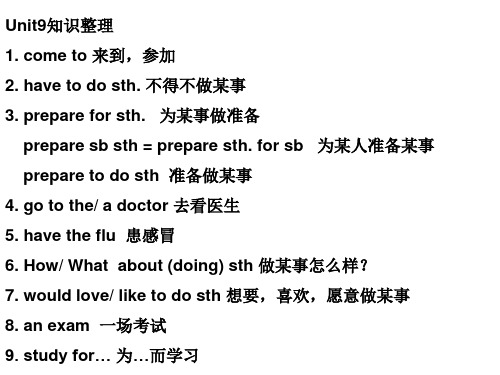
19. catch the early bus 赶上早班车 catch up with sb 赶上某人 catch you on Monday= see you on Monday 周一见
20. finish doing sth 结束做某事 21. plan to do sth 计划/打算做某 ( planning) 22. invite sb to do sth 邀请某人做某事
Do you know month?
一月:January
二月:February
三月:March
四月:April
五月:May
六月:June
七月:July
八月:August
九月:September 十月:October
十一月:November 十二月:December
Dear Tina,
Thanks for you invitation. I’m sorry I can’t go to your birthday party. I am not available on Sunday. My mother has to go to work on Sunday. And I have to look after my little sister at home because she is too young. And I also need to prepare food for her.
an invitation 一个邀请,一个请柬 23. refuse to do sth 拒绝做某事 24. 绿色方框会背!!!!! 25.play soccer 踢足球 26. have a piano lesson 上钢琴课 27. look after= take care of 照顾
八年级上册英语知识点归纳(人教版新课标)
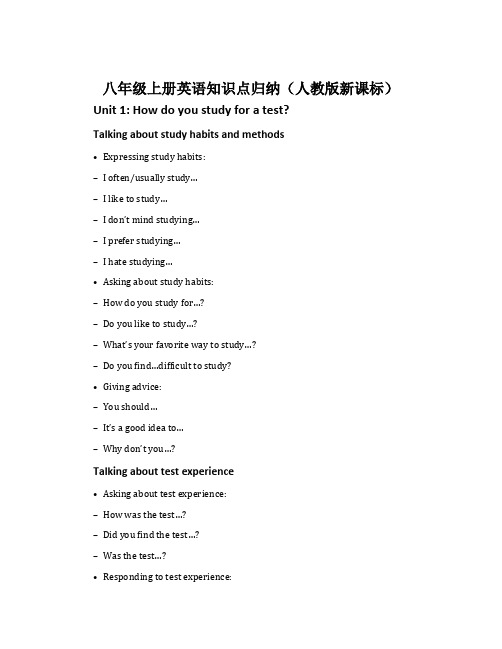
八年级上册英语知识点归纳(人教版新课标)Unit 1: How do you study for a test?Talking about study habits and methods•Expressing study habits:–I often/usually study…–I like to study…–I don’t mind studying…–I prefer studying…–I hate studying…•Asking about study habits:–How do you study for…?–Do you like to study…?–What’s your favorite way to study…?–Do you find…difficult to study?•Giving advice:–You should…–It’s a good idea to…–Why don’t you…?Talking about test experience•Asking about test experience:–How was the test…?–Did you find the test…?–Was the test…?•Responding to test experience:–The test was…–It was…difficult/easy/interesting…–I feel…about the test.Unit 2: I used to be afraid of the dark. Talking about past habits and activities •Expressing past habits:–I used to…–I would…–When I was younger, I…–In the past, I…•Talking about changes:–I used to…but now I…–I would…but now I…•Asking about past habits:–Did you use to…?–Would you…?Describing past experiences•Asking about past experiences:–Have you ever…?–When was the las t time you…?–How many times have you…?•Responding to past experiences:–Yes, I have…–No, I haven’t…–The last time I…was…Unit 3: Teenagers should be allowed to choose their own clothes.Describing clothing and personal style•Describing clothing:–I like to wear…–My favorite outfit is…–I prefer wearing…•Describing personal style:–My style is…–I like to dress…–I feel comfortable in…–I don’t like to wear…Expressing opinions on dress codes•Agreeing with dress codes:–I think dress codes are…–It’s important to have dress codes because…–Dress codes help…•Disagreeing with dress codes:–I don’t think dress codes are…–Dress codes don’t allow…–Dress codes can be…•Suggesting alternatives:–Instead of dress codes, we could…–A better solution would be…–We should consider…Unit 4: I used to be afraid of snakes.Talking about fears and phobias•Expressing fears and phobias:–I’m afraid of…–I have a fear of…–I can’t stand…•Asking about fears and phobias:–Are you afraid of…?–What are you scared of…?–Do you have any phobias?•Offering reassurance:–There’s nothing to be afraid of.–Don’t worry, it’s not dangerous.–You’ll be fine, I promise.Unit 5: What were you doing when the bus arrived? Talking about past actions and interruptions •Describing past actions:–I was…–I was in the middle of…–At that time, I was…•Describing interruptions:–Suddenly, someone…–While I was…, someone…–At that moment, something…•Asking about past actions:–What were you doing when…?–Were you…when…?•Responding to interruptions:–I had to stop because…–I couldn’t finish because…–I had to deal with…Unit 6: An old man tried to move the mountains.Talking about determination and perseverance•Describing determination:–He/she was determined to…–He/she never gave up…–Against all odds, he/she…•Describing perseverance:–He/she kept trying…–He/she didn’t let anything stop him/her…–No matter how difficult, he/she…•Expressing admiration:–I admire his/her…–His/her determination is inspiring…–He/she is a role model because…Unit 7: Teenagers should be allowed to have part-time jobs. Discussing advantages and disadvantages of part-time jobs •Discussing advantages:–Part-time jobs can teach…–Having a part-time job gives…–It’s a great opportunity to…•Discussing disadvantages:–Part-time jobs can interfere with…–Working too m uch can…–It might affect…•Expressing personal opinion:–I think teenagers should…–In my opinion, it’s important for teenagers to…–I believe that having a part-time job…Unit 8: Integrated skillsPracticing integrated skills in listening, speaking, reading, and writing •Listening: Listening to conversations, interviews, and speeches to improve comprehension skills.•Speaking: Engaging in discussions, debates, and presentations to improve speaking fluency and expressing opinions.•Reading: Reading various texts, articles, and stories to improve vocabulary, reading comprehension, and critical thinking skills.•Writing: Practicing different types of writing, such as essays, letters, and journals, to improve writing skills and creativity.ConclusionThis document provides a comprehensive overview of the key language points and topics covered in the eighth-grade English textbook of the People’s Education Press (PEP) according to the new national curriculum standard. By understanding and practicing these knowledge points, students can improve their English proficiency in various aspects, including vocabulary, grammar, speaking, listening, reading, and writing.。
新人教版八年级上册英语单元语法及知识点概述
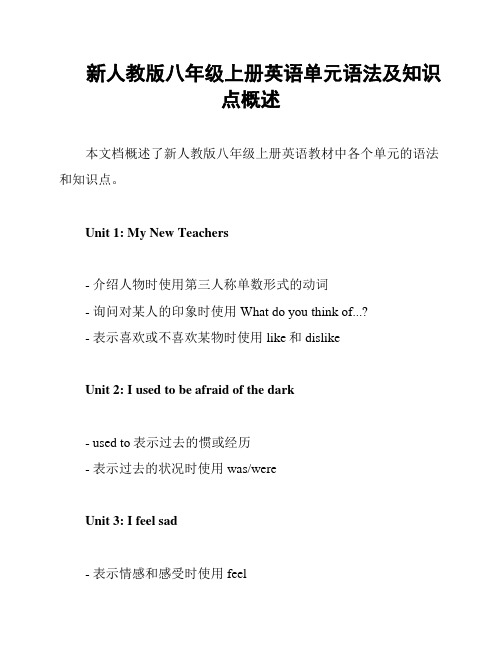
新人教版八年级上册英语单元语法及知识点概述本文档概述了新人教版八年级上册英语教材中各个单元的语法和知识点。
Unit 1: My New Teachers- 介绍人物时使用第三人称单数形式的动词- 询问对某人的印象时使用What do you think of...?- 表示喜欢或不喜欢某物时使用like和dislikeUnit 2: I used to be afraid of the dark- used to表示过去的惯或经历- 表示过去的状况时使用was/wereUnit 3: I feel sad- 表示情感和感受时使用feel- 使用be动词+形容词表达情感状态- 表示总是或经常做某事时使用always或often Unit 4: What's the best movie theater?- 比较级和最高级的用法- 询问建议时使用What do you suggest?- 表示原因时使用becauseUnit 5: It must belong to Carla- 表示推测或某事是肯定的时使用must- 表示推测或某事是可能的时使用might- 表示推测或某事是否定的时使用can'tUnit 6: I like music that I can dance to- 表示喜欢某种中性事物时使用like- 表示喜欢可以+动词原形的事物- 表示不喜欢不可以+动词原形的事物Unit 7: Teenagers should be allowed to choose their own clothes- 表示应该或不应该做某事时使用should or shouldn't- 表示能够或不允许做某事时使用can or can't- 使用be动词+动词不定式表示被允许或不被允许做某事Unit 8: Home alone- 表示需要或必需做某事时使用have to- 表示过去需要或必需做某事时使用had to- 表示建议或推荐时使用should或had betterUnit 9: When was it invented?- 使用一般过去时表示过去的经历或事件- 使用一般过去时的疑问句形式提问过去的经历或事件- 使用介词短语表示一段时间以上是新人教版八年级上册英语教材中各单元的语法和知识点概述。
人教版8上 Unis1-5 单元知识必背清单
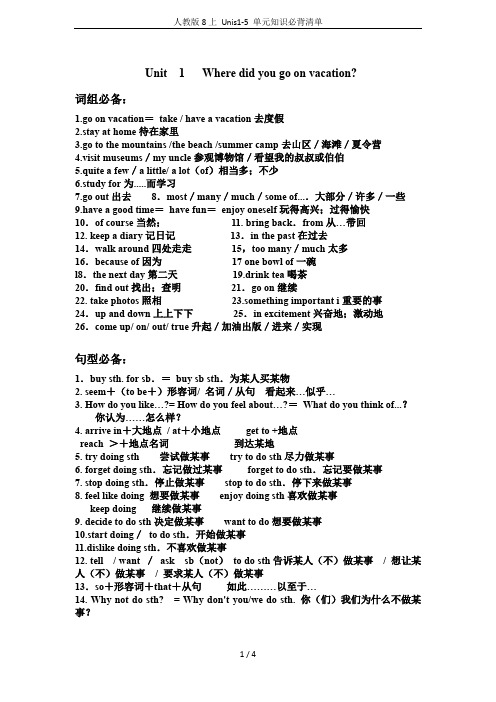
人教版8上Unis1-5 单元知识必背清单Unit 1 Where did you go on vacation?词组必备:1.go on vacation=take / have a vacation去度假2.stay at home待在家里3.go to the mountains /the beach /summer camp去山区/海滩/夏令营4.visit museums/my uncle参观博物馆/看望我的叔叔或伯伯5.quite a few/a little/ a lot(of)相当多;不少6.study for为.....而学习7.go out出去8.most/many/much/some of....大部分/许多/一些9.have a good time=have fun=enjoy oneself玩得高兴;过得愉快10.of course当然;11. bring back.from从…带回12. keep a diary记日记13.in the past在过去14.walk around四处走走15,too many/much太多16.because of因为17 one bowl of一碗l8.the next day第二天19.drink tea喝茶20.find out找出;查明21.go on继续22. take photos照相23.something important i重要的事24.up and down上上下下25.in excitement兴奋地;激动地26.come up/ on/ out/ true升起/加油出版/进来/实现句型必备:1.buy sth. for sb.=buy sb sth.为某人买某物2. seem+(to be+)形容词/ 名词/从句看起来…似乎…3. How do you like…?= How do you feel about…?=What do you think of...?你认为……怎么样?4. arrive in+大地点/ at+小地点get to +地点reach >+地点名词到达某地5. try doing sth 尝试做某事try to do sth尽力做某事6. forget doing sth.忘记做过某事forget to do sth.忘记要做某事7. stop doing sth.停止做某事stop to do sth.停下来做某事8. feel like doing 想要做某事enjoy doing sth喜欢做某事keep doing 继续做某事9. decide to do sth决定做某事want to do想要做某事10.start doing/to do sth.开始做某事11.dislike doing sth.不喜欢做某事12. tell / want /ask sb(not)to do sth告诉某人(不)做某事/ 想让某人(不)做某事/ 要求某人(不)做某事13.so+形容词+that+从句如此………以至于…14. Why not do sth? = Why don't you/we do sth. 你(们)我们为什么不做某事?Unit 2 How often do you exercise?词组必备:1.help with housework=help(to )do housework 忙做家务2. go shopping/camping 去购物/野营3.on/at weekends=on/at the weekend在周末4.how often多久一次5.hardly ever几乎从不6.once a week一周一次7.twice a monthー个月两次8.go to the movies去看电影9.every day每天10.use the Internet使用互联网11.be free(=have time)有空(反:be busy忙碌)12.have a/an.lesson(=have... lessons)上…课13.swing dance摇摆舞14.play tennis打网球15.stay up(late)熬夜16.at least至少;不少于;起码17.go to bed early早点儿睡觉18.play sports=do sports进行体育活动19.be good for对……有好处(反:be bad for对有害)20.be full满的21.in one’ s free time在某人的空余时间22.not.....at all 一点儿也不23.the most popular最受欢迎的24. such as例如;像…这样25.three or four times a week一周三四次26.go to the dentist去看牙医27.more than多于(反:less than少于)28.the answers to…的答案29. go online上网30.teeth cleaning牙齿清洁31.a few几个,一些(反:few没有几个,很少)32.ask sb. about sth向某人询问某事句型必备:1.How often do you... ...?你多久做... ... ...次2.What kind of…...?什么种类的... ...?3.What do/does sb.usually do on weekends?某人周末通常做什么?4.How about(doing)... ...?(做)…怎么样?5.help sb.with sth.=help sb.(to)do sth.帮助某人做某事6.want(sb.))to do sth.想要(某人)做某事7.主语+find(s)+that从句... ...发现8.It’s+形容词+to do sth.做某事是……的9.spend time with sb.和某人一起度过时光10.by doing sth.通过做某事11.What's your favorite.?你最喜爱的…是什么?12.start doing/to do sth.开始做某事13.the best way to do sth.做某事的最好方式Unit 3 I am more outing than my sister.词组必备:1.both....and…和…都2.play the drums敲鼓3. as.. as与……一样…(否:not as/so..as... 不如……)4.the singing competition 歌咏比赛5.be talented in music有音乐天赋6.the same as和…相同;与…一致7.be similar to.....与…类似8.care about关心;在意9.make friends交朋友10.be different from与…不同;与…有差异11.be like a mirror像一面镜子12.as long as只要;既然13.bring out使显现;使表现出14.get better grades 取得更好的成绩15.reach for one’s hand伸手帮某人一把16. touch one’s heart J感动某人17.be good with 与…相处得好句型必备:1. have fun doing sth 做某事有乐趣2.be good at doing sth 擅长做某事3.want to do sth.想要做某事4.as+形容词或副词的原级+as 与.....一样......5.enjoy doing sth.喜欢做某事6.make sbdo sth.让某人做某事7 .It’s+形容词+for/of sb to do sth.对某人来做某事是…的。
新人教版英语初二上册知识点
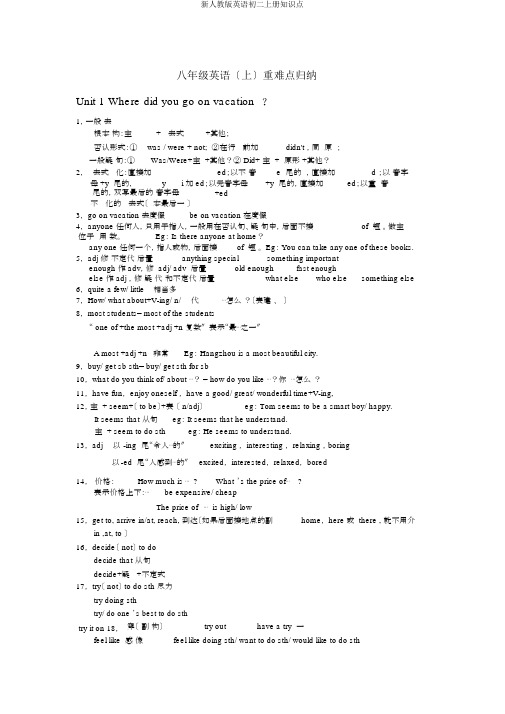
八年级英语〔上〕重难点归纳Unit 1 Where did you go on vacation?1,一般去根本构:主+去式+其他;否认形式:①was / were + not; ②在行前加didn't ,同原;一般疑句:①Was/Were+主 +其他?② Did+ 主 +原形 +其他?2,去式化:直接加ed;以不音 e 尾的,直接加 d ;以音字母 +y 尾的,y i 加 ed;以元音字母+y 尾的,直接加ed;以重音尾的,双写最后的音字母+ed不化的去式〔本最后一〕3, go on vacation 去度假be on vacation 在度假4, anyone 任何人,只用于指人,一般用在否认句、疑句中,后面不接of 短。
做主位于用数。
Eg: Is there anyone at home?any one 任何一个,指人或物,后面接of 短。
Eg: You can take any one of these books. 5, adj 修不定代后置anything special something importantenough 作 adv,修 adj/ adv 后置old enough fast enoughelse 作 adj ,修疑代和不定代后置what else who else something else 6, quite a few/ little相当多7, How/ what about+V-ing/ n/代⋯怎么?〔表建、〕8, most students= most of the students“ one of +the most +adj +n 复数〞表示“最⋯之一〞A most +adj +n非常Eg: Hangzhou is a most beautiful city.9, buy/ get sb sth= buy/ get sth for sb10, what do you think of/ about ⋯? = how do you like ⋯?你⋯怎么?11, have fun, enjoy oneself , have a good/ great/ wonderful time+V-ing,12,主 + seem+〔 to be〕+表〔 n/adj〕eg: Tom seems to be a smart boy/ happy.It seems that 从句eg: It seems that he understand.主 + seem to do sth eg: He seems to understand.13, adj以-ing尾“令人⋯的〞exciting , interesting , relaxing ,boring以-ed 尾“人感到⋯的〞 excited, interested, relaxed, bored14,价格:How much is ⋯ ?What ’s the price of⋯表示价格上下:⋯be expensive/ cheapThe price of⋯is high/ low15, get to, arrive in/at, reach, 到达〔如果后面接地点的副?home, here 或there , 就不用介in ,at, to 〕16, decide〔 not〕 to dodecide that 从句decide+疑 +不定式17, try〔 not〕 to do sth 尽力try doing sthtry/ do one ’s best to do sthtry it on 18,feel like 穿〔副构〕try out have a try 一感像feel like doing sth/ want to do sth/ would like to do sth19, a lot of= lots of =plenty of20, in the past 在去21, enjoy/ like doing22,感句: How+adj+ 主!How+adj+a/an +n+主!What+ a/an +adj+ n+主!What+ adj+ n 复 / 不可数 +主!23, more than=over 超less than 少于more or less 或多或少24, wait for 等待25, too many“太多〞修可数名复数too much“太多〞修不可数名much too“ 在太〞修形容或副26, because+从句because of +n/ V-ing / 代27, enough 作 adj 修 n,enough time enough moneyhave enough⋯ to do sth eg: I have enough time to finish the work.enough 作 adv 修 adj/ adv old enough fast enough⋯enough for sb to do sth eg: The job is easy enough for me to do.not⋯ enough to do The book isn ’teasy enough for me to read.too⋯ to⋯The book is too difficult for me to read.so⋯ that⋯The book is so difficult that I can ’tread.28, the next day 第二天29, remember/ forget+to do 要做+doing 做30, Stop sb from doing sth 阻止Stop to do 停下来去做其他事Stop doing 停止正在做的事31, another two hours=two more hours32, at the top of 在⋯端,名列⋯之前点on the top of 在⋯上面面33, find out 明,弄清find 找到〔果〕look for 找〔程〕34, go on with/ doing sth 原来的事go on to do sth 做的事35, so +adj +that + 果状从句“如此⋯⋯以致⋯⋯〞eg: I was so busy that I didn ’tgo to sleep for 3 days.so that 引目的状从句,以便,了〔in order to 〕eg: they got up early so that they could catch the early bus.so +adj +〔 a/ an+n 数〕 that It is so important a meeting that I can ’tmiss it.such+ a/ an+ adj + n 数 +that It is such an important meeting that I can ’tmiss it.such+ adj+n 复数 /不可数 +thatUnit 2 How often do you exercise ?1, How如何〔方式〕how long多〔〕答常用“〔For/ about how far 多〔距离〕答常用“〔It’+〕s数+〕段〞+ miles/ meters/ kilometers〞how often多久一次〔率〕答常用“Always/ often/ every day/〞或⋯“次数+〞等表率的状How soon多快,多久以后,常用在将来中。
八年级上册英语人教版知识点总结
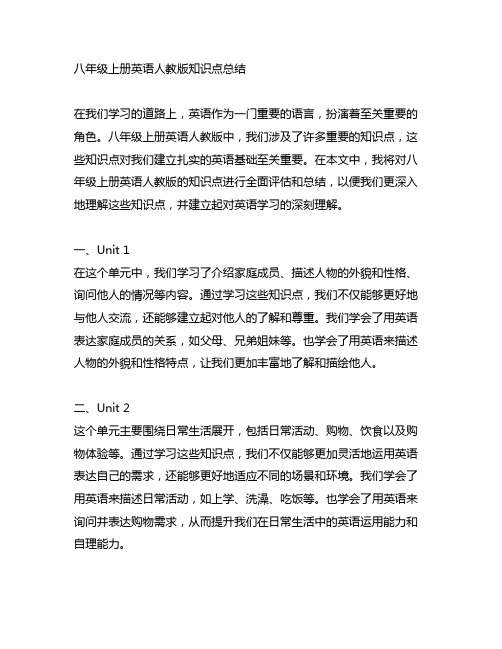
八年级上册英语人教版知识点总结在我们学习的道路上,英语作为一门重要的语言,扮演着至关重要的角色。
八年级上册英语人教版中,我们涉及了许多重要的知识点,这些知识点对我们建立扎实的英语基础至关重要。
在本文中,我将对八年级上册英语人教版的知识点进行全面评估和总结,以便我们更深入地理解这些知识点,并建立起对英语学习的深刻理解。
一、Unit 1在这个单元中,我们学习了介绍家庭成员、描述人物的外貌和性格、询问他人的情况等内容。
通过学习这些知识点,我们不仅能够更好地与他人交流,还能够建立起对他人的了解和尊重。
我们学会了用英语表达家庭成员的关系,如父母、兄弟姐妹等。
也学会了用英语来描述人物的外貌和性格特点,让我们更加丰富地了解和描绘他人。
二、Unit 2这个单元主要围绕日常生活展开,包括日常活动、购物、饮食以及购物体验等。
通过学习这些知识点,我们不仅能够更加灵活地运用英语表达自己的需求,还能够更好地适应不同的场景和环境。
我们学会了用英语来描述日常活动,如上学、洗澡、吃饭等。
也学会了用英语来询问并表达购物需求,从而提升我们在日常生活中的英语运用能力和自理能力。
三、Unit 3在这个单元中,我们学习了关于过去的经历和事件的表达,包括过去的时间状语、过去进行时和一般过去时等内容。
通过学习这些知识点,我们能够更加清晰地表达过去发生的事情,让我们的交流更加生动和具体。
我们学会了用英语来描述过去的经历和事件,如去年的假期、上个月的生日聚会等。
也学会了用英语来表达过去的习惯和行为,让我们对过去的事情有了更加深刻的认识。
四、Unit 4这个单元主要涉及到人物的性格特点和对话的表达,在这个单元中,我们学习了如何用英语来描述人物的性格特点以及如何进行礼貌的交流。
通过学习这些知识点,我们不仅能够更加细致地了解他人,还可以提升我们的交际能力和人际交往技巧。
我们学会了用英语来描述人物的性格特点,如勇敢、有趣、乐观等。
也学会了用英语来进行礼貌的交流,让我们的交际更加愉快和和谐。
人教版八年级上册英语unit详细知识点
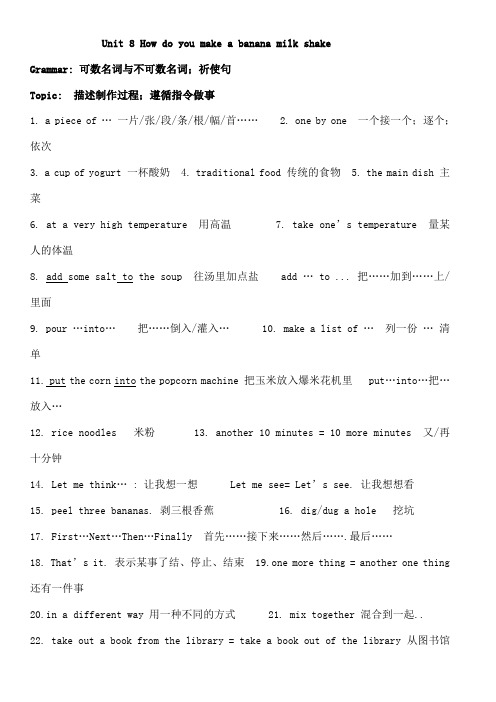
Unit 8 How do you make a banana milk shakeGrammar: 可数名词与不可数名词;祈使句Topic: 描述制作过程;遵循指令做事1. a piece of … 一片/张/段/条/根/幅/首……2. one by one 一个接一个;逐个;依次3. a cup of yogurt 一杯酸奶4. traditional food 传统的食物5. the main dish 主菜6. at a very high temperature 用高温7. take one’s temperature 量某人的体温8. add some salt to the soup 往汤里加点盐add … to ... 把……加到……上/里面9. pour …into… 把……倒入/灌入… 10. make a list of … 列一份… 清单11. put the corn into the popcorn machine 把玉米放入爆米花机里put…into…把…放入…12. rice noodles 米粉 13. another 10 minutes = 10 more minutes 又/再十分钟14. Let me think… : 让我想一想Let me see= Let’s see. 让我想想看15. peel three bananas. 剥三根香蕉 16. dig/dug a hole 挖坑17. First…Next…Then…Finally 首先……接下来……然后…….最后……18. That’s it. 表示某事了结、停止、结束 19.one more thing = another one thing 还有一件事20.in a different way 用一种不同的方式 21. mix together 混合到一起..22. take out a book from the library = take a book out of the library 从图书馆里借出一本书23. How do you make a banana milk shake 你怎样制作一份香蕉奶昔摇动;抖动: Give the bottle a good shake. 好好地摇一下瓶子..v 使摇动/颤抖:Shake the bottle before drinking.抖落: He shook the snow off his coat at the door.shake hands 握手shake one’s head 摇头 for a shake 一瞬间24. Turn on the blender. 打开搅拌器..turn on:打开电、煤气、水等Will you please turn on the light It’s too dark.turn off: 关掉电、煤气、水等 Please turn the light off when you leave the building.turn up: 调高音量等I can’t hear clearly; please turn up the radio.出现If he doesn’t turn up in ten minutes; we’ll have togo.turn down: 调低音量等:Please turn down the TV when I’m talking on the phone.拒绝 She turned down his invitation.25. cut up the bananas. 把香蕉切碎..cut:n切口;伤口;v 切;割;剪;砍;削等cut… into… :把…切成… cut the turkey into pieces.cut off:切断;中断 He almost cut off his finger while working.cut up 切碎;剁碎 cut the onion up in small pieces.伤害;折磨: He was cut up badly when he fell off his bike.cut down:砍倒;削减 They cut down the old trees in order to build a new factory.22.A: How much yogurt do we need B: We need one cup of yogurt. 1. how many: 多少 + 可数名词: how many watermelons do you need how much 多少 +不可数名词: How much cheese/sugar do we need多少钱= What’d the price of… How much is the butter 2. n : There’s no need for you to hurry. 你没有必要慌张.. Sb. need sth. She needs help. v 实 Sb. need to do sth. You need to get it back tomorrow. 需要; Sth. need doing = sth. need to be done. The bike needs repairing.必须 v 情: 用于否定和疑问: You needn’t tell me. 你没有必要告诉我..Need I go there Yes; you must./have to. No; you needn’t.in need of…: 需要… at need: 在紧急时23.Next;fill the turkey with this bread mix. 接下来;把这个面包混合物填充到火鸡里..使充满;装满: fill A with B = A be filled with B = A be fullof B 1. Fill the bottle with water. = The bottle is filled with / is full of water.占据;胜任职位;工作 : She is the best person to fill this kind of job.混合物=mixture ;食品混合干配料 a cake mix使掺和;使混合: She mixes the flour and milk together.2. mi x…with…: 把…与…调在一起 He mixed red paint with needyellow paint.v mix… into…: 把…掺在…里面 She mixed some salt into the soup.调制: mix salad 拌色拉24.When it is ready; place the turkey on a large plate and cover it with gravy.盖子;封面;罩: The book has a blue cover.覆盖;遮盖: cover … with… = …be covered with…v She covered the table with a cloth. = The table was coveredwith a cloth.掩饰;隐瞒 Jim tried to cover his mistake with a joke.25.Finally; serve it to your friends with some vegetables. 最后;与其它食物一起端出来供朋友使用..为…服务/工作/效力: serve people.接待;服侍顾客:Are you being served 你点过菜了吗 /有人接待你吗端出食物;伺候…进餐:serve the fish to the guests.26.Now; it’s time to enjoy the rice noodles 现在;到了享用米粉的时候了..for sth. : It’s time for supper. to do sth. It’s time to have supper是…的时候了 for sb. to do sth. It’s time for you to get up.可数名词与不可数名词1. 可数名词 ----可数名词指物体的数量可数..其单数形式可在名词前加a 或an;表示“一个”;如:a banana..其复数形式要在词尾加s 或es 特殊情况除外;如:two bananas.. 名词复数的不规则变化:man-men woman-women policeman男警察-policemen policewoman女警察-policewomen mouse-mice child-children foot-feet tooth-teethfish-fish sheep-sheep deer -deer people-people Chinese-Chinese Japanese-Japanese1以fe结尾的名词变复数leaf→leaves half→halves wife→wives knife→knives shelf→shelves wolf→wolves thief→thieves2 以o结尾的: hero; Negro; tomato;potato + es; 其他的都加s:radio;zoo..表示“某国人”的名词变复数中日不变英法变;其他-s加后面.. Chinese; Japanese; Englishman; Frenchman; American; Australian; German2. 不可数名词 -------不可数名词指物体的数量不可数..不可数名词没有单复数之分;也不能在词前直接加冠词a或an..表示不可数名词的数量时可在不可数名词前加相应的数量词构成短语.. 如:a piece of…; a glass of…; a bottle of….; a bag of…; a teaspoon of…等..二.1.既可修饰可数名词也可修饰:all; some; most; a lot of; lots of; plenty of …2.修饰可数名词的词有:数词one...; few; a few; many; a number of; numbers of...3. 修饰不可数名词的词有:little; a little; a bit of; much; a great deal of; a large amount of4. 不可数名词通常用“数词+量词+of+不可数名词”表示复数: three pieces ofpaper祈使句一.定义:祈使句指的是表示命令、请求、建议或劝告的句子..其主语you常省略;谓语动词用原形;句末用感叹号或句号;读降调..二.结构:1. 肯定的祈使句:动词原形+其他 Stand up; please. Be careful2.否定的祈使句: 1. Don't + 动词原形Don’t laugh at others.2. Never do sth. Never do that again3. No + v-ing/n. No smoking No noise; please.4. Let’s not do sth. Let’s not waste time.5. Don’t let sb. do sth. Don’t let them make any noise.Unit 8 How do you make a banana milk shake一、词汇积累1. milk shake 奶昔shake v. & n. 摇动;抖动shake hands with sb./ shake one’s hands 与某人握手2. turn on 打开反义词:turn off 关上turn up 调大;开大音量反义词:turn down 调低音量易错点:遇到动词加副词;要符合以下原则:动词加副词;名词两边放;代词放中间..e.g. turn on the radio = turn the radio on;但是 turn it on 不能说 turn on it3. cut up 切碎过去式:cut; 过去分词:cutcut up = cut into pieces 切成碎片cut into halves 切成两半4. make v. 制作;做make sth. For sb. = make sb. sth. 为某人做某物与make 的一些搭配:make friends 交朋友make a mistake/ mistakes 犯错误make tea 沏茶v. 使役动词“使”make sb. do sth. 使某人做某事make sb./ sth. + adj. 使某人/ 某物……5. need v. & n. 需要v. need sth. 需要某物 need to do sth. 需要做某事n. He can’t meet all your need.作情态动词“需要”;后面用动词原形;常用于否定和疑问句中:e.g. You needn’t finish your work now.---Need I go there with him---Yes; you must./ No; you needn’t.6. another adj. & pron. 另一;再一e.g. Can I have another cake another 作形容词Give me another. another 作代词注意:another 与 one more 意思相同;表示另外几个时;another 后面接相应的数词;而one more 中的“one”也改为相应的数词..e.g. I want to buy another three pencils. = I want to buy three more pencils.7. forget v. 忘记反义词:remember 记得forget sth./ sb. 忘记某事/ 某人forget to do sth. 忘记去做某事事情未做forget doing sth.忘记做过某事事情已做常会遇到一个词“leave”;也可表“遗忘”leave sth. at/ in/ on + 某地把某物忘记在……8. like v. & n. & prep.喜欢;喜好;像v. like sth./ sb.like to do sth./ like doing sth. 喜欢做某事n. likes and dislikes 喜好反义词:dislikeprep. 像反义词:unlike9. traditional adj. 传统的 tradition + al traditional n. + al adj.10. a time to………的时间It’s time to do sth. 到了该做……的时候了 It’s time for sth./ doing sth.11. give thanks for…为……表达谢意 Thanks for doing sth. = Thanks for sth.12. remember v. 记得;记起;回想起remember sth./ sb. 记得某事/ 某人remember to do sth.记得去做某事事情未做remember doing sth.记得做过某事事情已做 remember me to sb. 代我问候某人13. traveler = traveller 漂泊者;旅行者;游客= tourist 旅游者;观光者14. celebrate v. 庆祝;庆贺celebrate one’s birthday/ 节日/ 胜利celebration n. 庆祝15. mix … with…把A 和B混在一起be mixed with…被动语态16. fill… with…用……填充……be filled with = be full ofbe filled with…被动语态A is filled withB A被B填满动作 A is full of B A充满着B 状态17. cover… with…用……遮盖cover sth. with sth. be covered with 被某物覆盖被动语态18. serve v. 服务;提供serve sb. sth. = serve sth. to sb. 提供某人某物serve sb. 为某人工作 serve servicen. servant佣人19. temperature n. 温度;气温;体温既可作可数名词;又可作不可数名词get/ have a temperature = get/ have a fever 发烧take one’s temperature 试体温;量体温20. the reason for…是……的原因理由 the reason to do 有理由干某事21. to make this special food 不定式做目的状语e.g. The doctor did what he could to save the injured girl. 表目的to do 还可在句中作后置定语 e.g. I have a lot of work to do.Unit 8 How do you make a banana milk shake本单元的话题:描述做事情的顺序和过程..First首先;Next下面;Then然后;Finally最后本单元的语法:复习一般现在时..本单元的短语和知识点:1P57;1a turn on打开 turn up调大turn off关上 turn down调小Please turn on the lights.请打开灯..My father is sleeping;please turn down the radio.爸爸正在睡觉;请把收音机声音调小..2. P58;2a How many+可数名词复数:多少…How much+不可数名词:多少…He has eight books.他有八本书..→How many books does he have他有多少本书How much water does he need他需要多少水3. P58;2a 量词的用法:不可数名词常用“数字+量词+不可数名词”来表示..如:a piece of bread一片面包比较:two piece s of bread两片面包bread为不可数名词a glass of orange 一玻璃杯橘子汁 one spoon of butter 一勺黄油4.P58;2d说明做某事的顺序为:First…首先;N ext…下面;Then…然后;Finally…最后5.P58;2d末行one more thing = another one thing基数词 + more + 名词 = another + 基数词 + 名词:又多少某物He ate an apple;he wanted to eat two more apples.他吃了一个苹果;还想再吃两个.. 6.P59;3cDo you know how to plant trees你知道如何种树吗how to do sth.怎样做某事疑问词后跟动词须加to;即“疑问词 to do sth”He doesn’t know how to turn on the computer.他不知道如何打开电脑..7.P61;2b;4行It’s time for sb to do sth是某人该做某事的时间了..It’s time for us to have lunch.是我们该吃午饭的时候了..It’s time for sth是该做某事的时间了..It’s time for the class.是该上课的时候了..8.P61;2b;1段倒数3行by doing sth:通过…方式He learned English by listening to the radio.它通过听收音机学习英语..9.P61;2b;2段fill…with…用…装满;cover…with… 用…盖住10.P63;3a;3行need to do sth:需要做某事He needs to buy a new pen.他需要买一枝新钢笔..。
【精编】新人教版八年级英语上册unit知识点总结2021
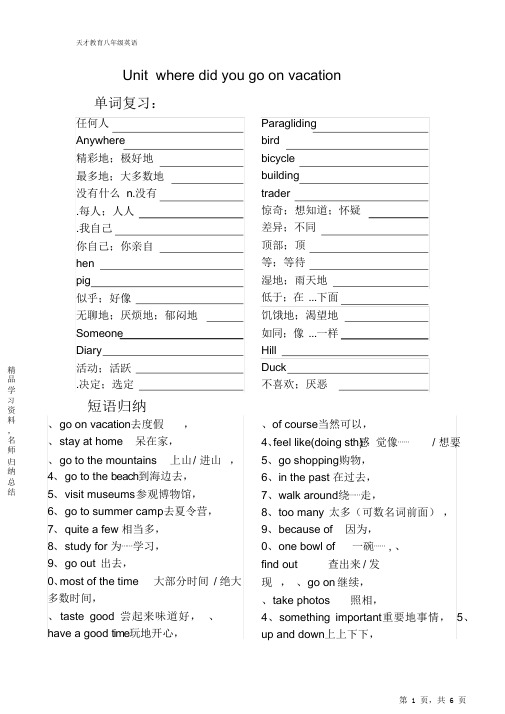
学资,总天才教育八年级英语Unit where did you go on vacation 单词复习:任何人Anywhere精彩地;极好地最多地;大多数地没有什么n.没有.每人;人人.我自己你自己;你亲自henpig似乎;好像无聊地;厌烦地;郁闷地SomeoneDiary精活动;活跃品.决定;选定习短语归纳料、go on vacation去度假,名、stay at home 呆在家,师归、go to the mountains 上山/ 进山,纳4、go to the beach到海边去,结5、visit museums 参观博物馆,6、go to summer camp去夏令营,7、quite a few 相当多,8、study for 为⋯⋯学习,9、go out 出去,0、most of the time 大部分时间/ 绝大多数时间,、taste good 尝起来味道好,、have a good time玩地开心,Paraglidingbirdbicyclebuildingtrader惊奇;想知道;怀疑差异;不同顶部;顶等;等待湿地;雨天地低于;在...下面饥饿地;渴望地如同;像...一样HillDuck不喜欢;厌恶、of course当然可以,4、feel like(doing sth感)觉像⋯⋯/ 想要,5、go shopping购物,6、in the past 在过去,7、walk around绕⋯⋯走,8、too many 太多(可数名词前面),9、because of 因为,0、one bowl of 一碗⋯⋯, 、find out 查出来/ 发现,、go on 继续,、take photos 照相,4、something important重要地事情,5、up and down上上下下,品,归26、come up出来天才教育八年级英语习惯用法、搭配1. buy sth. for sb.=buy sb. sth. 为某人买某物2. taste/look/smell/sound/feel + adj. 尝起来/ 看起来/ 闻起来/ 听起来/摸起来⋯⋯3. have nothing to do but + V.(原形) 除了⋯⋯之外什么都没有There was nothing much to do in the evening but read晚.以外无事可做。
- 1、下载文档前请自行甄别文档内容的完整性,平台不提供额外的编辑、内容补充、找答案等附加服务。
- 2、"仅部分预览"的文档,不可在线预览部分如存在完整性等问题,可反馈申请退款(可完整预览的文档不适用该条件!)。
- 3、如文档侵犯您的权益,请联系客服反馈,我们会尽快为您处理(人工客服工作时间:9:00-18:30)。
Unit3 I’m more outgoing than my sister ➢基础单词1.both A and B A和B都…2.both of…两者都…3.play the drums 敲鼓4.more outgoing 更外向/更开朗,5.as+形容词/副词+as... 与……一样,6.not as/so+形容词/副词+as 不如7.the singing competition 歌咏比赛8.the most important 最重要的9.something new 一些新的东西10.have fun doing sth. 过得愉快11.get up 起床12.work hard 努力工作;学习13.run fast 跑得快Section B1. be talented in…在……方面有天赋2. the same as 与……相同3.(truly) care about (真正)关心/留意/关注4. make sb. do sth. 使某人笑5. be different from 与…不同6. make friends with sb. 与某人交朋友7. as long as 只要;与…一样长8. bring out 拿出;推出9. in fact 事实上;实际10. primary school 小学12. get better grades取得好成绩,13. reach for伸手达到/达到14. touch one’s heart感动,17. be good at 在某方面成绩好,18. the other另一个,19. be similar to 与…相似,21. be like a mirror 像一面镜子20. be good with 与…和睦相处22. be friendly with sb. 对某人很友好23. It’s+ adj.+for sb. to do sth.对某人来说,做某事……的。
24. the most important thing is to ……最重要的事是…….➢重点讲解Section A形容词与副词的比较级大多数形容词(性质形容词)和副词有比较级和最高级的变化,即原级、比较级和最高级,用来表示事物的等级差别。
1.规则变化2.不规则变化more loudly, clearly, quietly/ most clearly, quietly, loudly. 但是,friendly 和healthy是形容词他们的比较是:friendlier 和healthier. 最高级是:friendliest, healthiesttalented, crowded 的比较级都是在前加more。
more talented, more crowded,句子结构:1.A+ be动词/谓语动词+形容词/副词的比较级+than+B2.A+ be动词/谓语动词+as+形容词/副词的原级+as +B3.A+ be动词/谓语动词+not+as/so+形容词/副词的原级+as +B4. the+比较级……;the+比较级……越……就越……Eg: The harder you work at your study, the better grades you will have.5. 比较级and 比较级表示越来越……Eg: It gets warmer and warmer when spring comes.注:much, a little 修饰比较级,用在比较级之前。
Eg;1. I’m ________ than my little brother. He is always very shy.A. clevererB. tallerC. quieterD. more outgoing2. Our school is ________ than their school.A. much beautifulB. much more beautifulC. more much beautifulD. a little beautiful3. Mike always does his homework as ______ as the exams.A. goodB. wellC. betterD. best4. ________ friends you have, ________ you will be.A. More; happierB. The more; the happierC. More; more happyD. The more; the more happy5.这本字典不如你想象的那样有用。
This dictionary____________ useful _________you think.2. 区别win和beat。
win 意为“赢,战胜,打败”,后接比赛,战斗,辩论,奖品,钱等。
win a game赢得比赛beat 意为“打败,战胜”,后接人和集体。
beat a team 战胜/打败一队Eg: ----Who ________ the tennis game yesterday?---- Jack, he ________ all the others.A.beat; wonB. won; won C .beat ;beat D. won; beatSection B1.make sb. do sth. 使某人做某事Eg;--- You look so tired.--- My mother makes me ______ playing the piano for 2 hours every day.A.practiceB. to practiceC. practicing2.辨析:reach, get to与arrive①reach为及物动词,后面直接接宾语。
E.g. They reached Hangzhou yesterday.②get to后接地点名词,如果接there,here或home等地点副词,to必须省略。
E.g. How did you get to the station?③arrive到达国家、城市等大的地方用in,到迭学校、商店等小的地方用at。
接there,here或home等地点副词时不用介词in或at。
E.g. I___________ the company three hours ago.They __________ Hangzhou yesterday.➢能力测评一. 汉译英。
1. 相反的观点________________2. 跑得快________________3. 跳得高________________4. 工作努力________________5. 擅长________________6. 赢得比赛________________7. 使显现_______________8. 两者都________________9. 玩得开心______________10. 关心,在意__________________二. 用所给单词的适当形式填空。
1. She is a little _________(heavy) than her sister.2. This book is _________(interest) and I like it very much.3. He is not funny, and he is always very _________(serious).4. Is Jack talented in _________(play) soccer?5. Lucy always _________(beat) me in swimming.6. A true friend _________ (reach) for your hand and _________ (touch)your heart.7. She is very funny and often makes me ________(laugh).8. I enjoy________(sing). I want to be a singer when I grow up.9. Here are ________(photo) of my brother.10. There are some ________(different) between the twins.三.根据题意从括号内选择适当的单词完成下列句子。
1. I am a little __________ (short, shorter) than my brother.2. Helen is the __________ (young, younger) of the two.3. The __________ (soon, sooner) you come here, the __________ (good, better) it will be.4. She studies __________ (well, better) than me.5. Shanghai is bigger than __________ (any, any other) city in China.四. 单项选择。
1. My friend is the same _______ me. We are _______ quiet.A. as; bothB. as; allC. to; bothD. to; all2. Is Tara shorter than Tina? Yes, she is ______ Tina.A. as tall asB. not as tall asC. taller thanD. as taller as3. Pedro is quite funny. He often makes us _______ .A. laughB. to laughC. laughingD. laughed4. Tom has _______ than Sam and he is as young as Sam.A. short hairB. shorter hairC. a short hairD. short hairs5. You can go out _____ you promise(许诺) to be back before 11 o’clock.A. as good asB. as far asC. as long asD. as short as6. There are some ________ between Pedro and Paul.A. different B.differences C. difference D. differents7. I want to find a friend who is similar _____ me.A. withB. asC. toD. for8. Who runs _______,Tom or Jim?A. fastB. fasterC. fastestD. more fast9. John is __________ than Peter.A. funnierB. funC. funnyD. more funny10. My sister is __________ more outgoing than me.A. moreB. mostC. a littleD. little11. __________like sports and are outgoing.A. Both of themB. Both theyC. They are bothD. They both are12. The new teacher is quite __________ Mr. Wang. I like her better.A. different fromB. the same asC. differenceD. the same to13. —Who is __________ , Maria or May?—I think May __________.A. smart; isB. very smart; doesC. smarter; doesD. smarter; is14. The tiger __________ the cat.A. looks the sameB. looks the same likeC. looks the same asD. looks like the same15. Look! Your bag is a little smaller than __________.A. hisB. herC. myD. their五. 完形填空。
